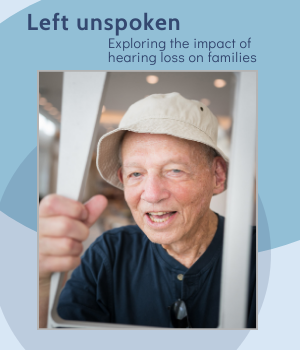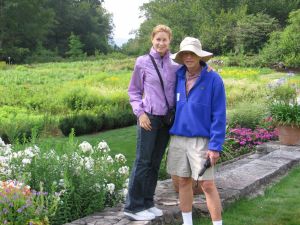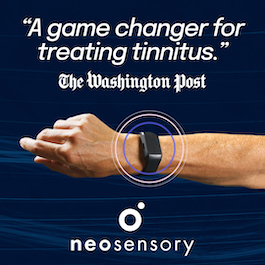|
www.HealthyHearing.com |
At 89 years old, my father finally got hearing aids—and his life was transformed
Contributed by Susan Marque “You’re warmed up now,” my father, Don, said to me from across the tennis court near his home in Naples, Florida, after we volleyed the ball for a few minutes. “You can have the advantage and serve first.”Our game kicked off, and I won several points, surprising him and myself. He was competitive, but he often went easy on me to keep the game going. Dad was happiest when we were alongside him in his athletic endeavors. 
“I’m just letting you think you could win, but watch out now,” he joked. “I’ve been taking dance classes, so I’ve got some new moves,” I said. But he couldn’t hear my reply and went ahead and served. There was usually more to his banter. I won the first set, and then the next. I wanted to gloat, but I realized my gain was actually due to his loss—and in more ways than one. His feet weren’t working as well as they used to, due to neuropathy that made them numb. And his hearing loss, which we didn’t fully recognize the extent of at the time, was making things worse, since part of athletic timing is being able to hear the ball hit the court. That was 20 years ago, and it was the only instance I’d ever beat him: He stopped playing tennis soon after that. For the next few years, as his health and hearing worsened, he stopped doing other things, too. One by one he stopped swimming, skiing, and most recently biking. Little by little he stopped talking on the phone, dropped socializing all together, and didn’t even want to play our traditional after dinner games on my visits, at least for awhile. We didn’t catch the early signs of hearing lossDad never mentioned that he didn’t hear well, only occasionally complaining of a ringing sound now and again—tinnitus—that was likely an indicator of the growing problem: presbycusis, or age-related hearing loss. I didn’t know that his frequent mumbling of words together, avoiding social gatherings, or frustrations with hearing the family TV are all common early signs of hearing loss. I just thought that was my Dad. Over time, Dad became despondent and more introverted than usual. If I had known the link between hearing loss and depression, I would have nudged Dad harder to go see a doctor. Studies have shown that it’s far more common than we might know as hearing declines, the level of sadness can build up. Multiple bike accidents raise a red flag
When my parents moved to Florida (first for winters when Dad was in his seventies and then full time about eight years ago.) Dad was somewhat rejuvenated as he got into biking. He ran errands for Mom, went on weekly bike rides with a group, and treated it like an occupation more than a hobby. Things were looking up. But then he was the victim of a hit-and-run and broke both of his arms. Undeterred, when his arms healed, he got back on his bike. Then he was hit a second time by a car in a parking lot when he was simply standing still. He blamed the driver who fled the scene. But I had noticed how he couldn’t hear sirens and began to wonder: Was he not hearing important sounds around him, like the sound of a car engine, or even a horn? I suggested hearing aids. He angrily scoffed. I backed down. But, unbelievably, he had a third bike accident. A turning pointThis seemed to be a breaking point for him. I felt helpless, watching him slowly fold into himself, his world reduced to reading books and surfing the internet. It pained me to see my sweet father sink into a fairly silent glumness. He began forgetting things I told him. I started to worry: Cognitive decline and hearing loss have a complex relationship. Was he forgetting entire lessons on how to use an app, or words I’d said a day ago, due to dementia? Or because he never heard me in the first place?
Nothing sunk in until I told him he needed hearing to drive, and if he didn’t pull over for a fire truck or police car, he would lose his license. Finally, Dad agreed to get hearing aids, and just as the studies showed, he perked up. At 89, he regained many of the things he had lost. He joined the local Y and began biking on a stationary bike, he started taking restorative yoga classes and became involved with selling his sculptures, hiring a photographer, a website builder, and going to shows. It was fabulous to see him talkative and smiling again. Not long after, he and Mom flew out to visit me in California. He was unstoppable. One afternoon, Dad and I took off on our own adventure to visit art galleries. We talked for the entire 45-minute train ride and he barely asked me to repeat anything—even when a group of teenage boys sat near us, fiddling with their skateboards. During the day, he chatted with everyone—a security guard at the gallery, librarians, store clerks, and even our Lyft driver on the way home. A few months later, he drove me home after a family dinner. I cringed as he took his favorite shortcut through a rough neighborhood, in the dark. But when he heard a dog bark and made a comment, I finally relaxed and must have let out a sigh. “What are you so worried about?” he asked. “Nothing, Dad,” I said, meaning it. "Nothing at all." |
Featured clinics near me
Hearing Health Solutions from Ohio ENT - Columbus
974 Bethel Rd Ste B
Columbus, OH 43214
Earzlink Hearing Care - Reynoldsburg
7668 Slate Ridge Blvd
Reynoldsburg, OH 43068


Find a clinic
We have more hearing clinic reviews than any other site!

